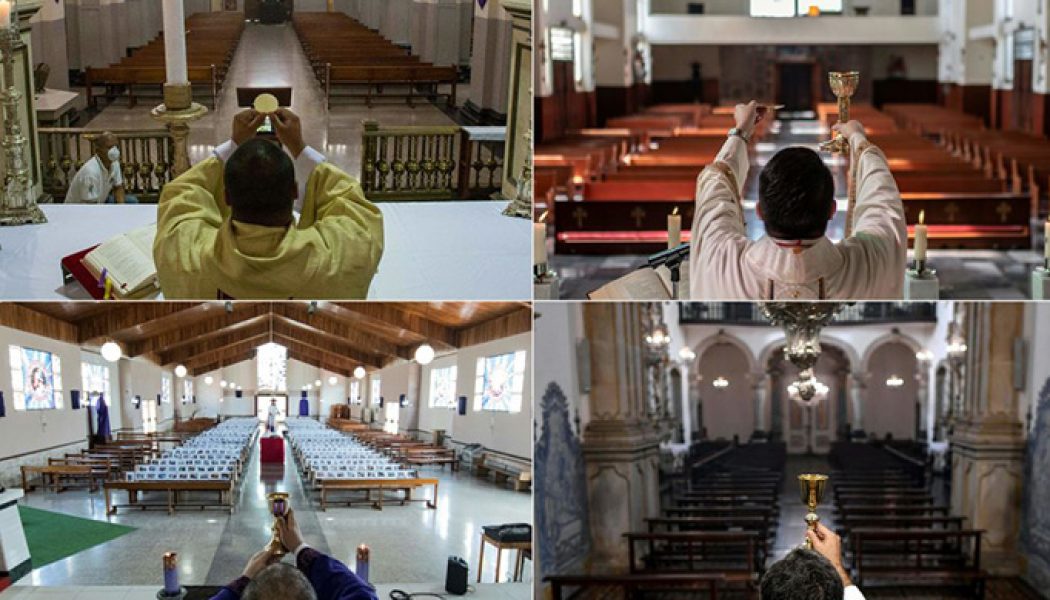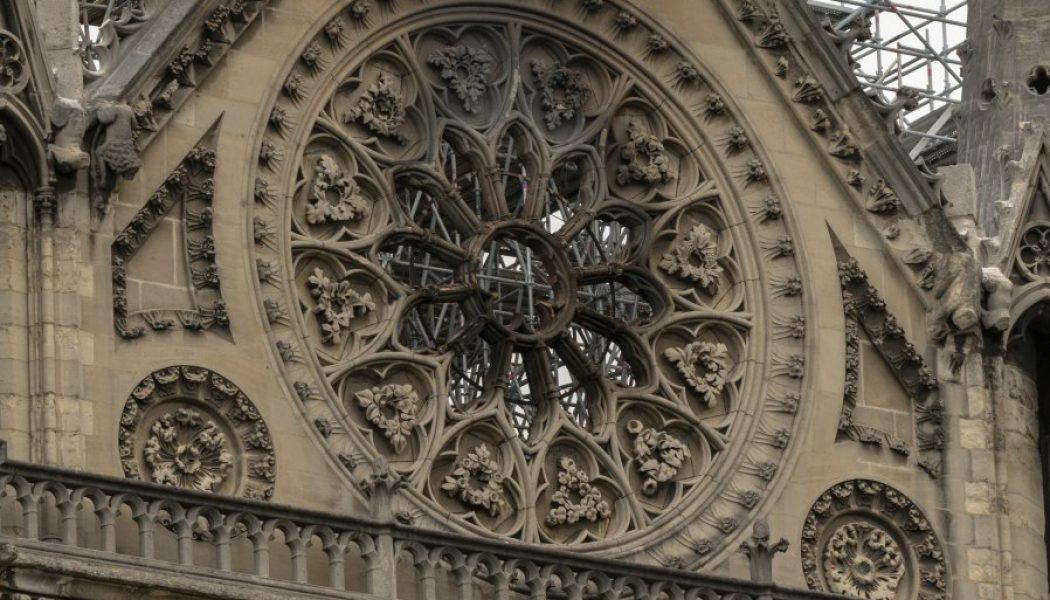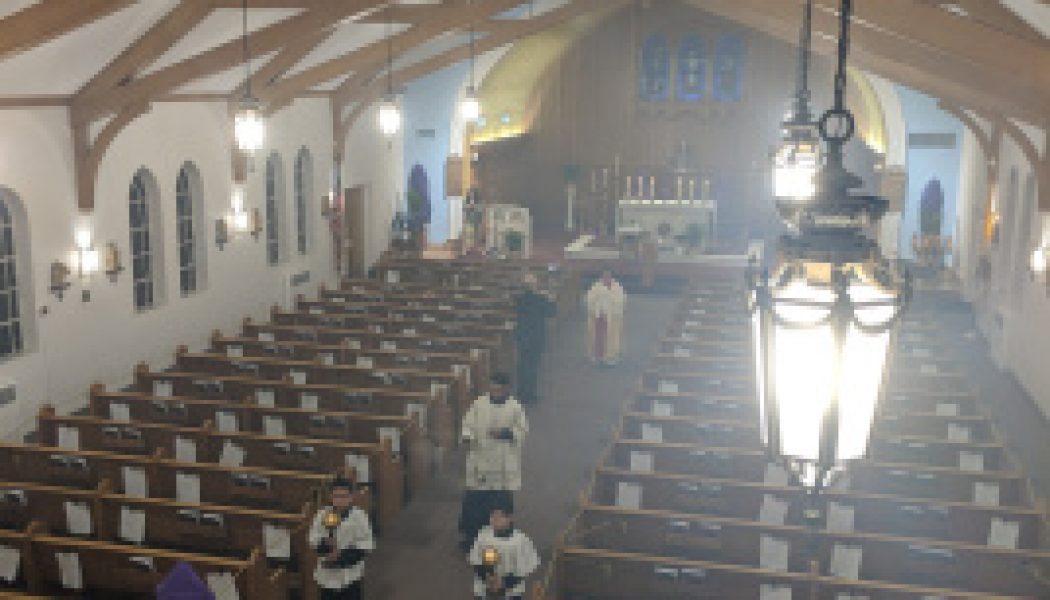Left
For Pope Francis, the quarantine has put two signature causes in conflict…
ROME – Today marks Day 42 without public Mass here in Italy, part of a nationwide coronavirus quarantine. As the infection rate continues to decline there’s been speculation about a ripresa, meaning a gradual return to normality, and as part of that scenario, the Italian bishops are in talks with the government as to when liturgical life can restart. RELATED: Italian bishops make proposal to government about restarting liturgical life Tensions around the shutdown are being felt all over the world, from Germany, where Catholic bishops are protesting a decision by Chancellor Angela Merkel to keep a ban on religious services in place while reopening thousands of shops, to the US, where the Kansas governor is in a court battle over limits on church gatherings and where Bishop Peter Baldacchino...
If you follow Jesus Christ who is mercy itself, He will bring you home…
The mercy of God is at work in the world because Jesus is at work in the world. He is bringing to completion the eternal plan of the Father in manifold ways – and the greater the work being done, the more hidden from our eyes the accomplishment. This is not magical thinking. It is simply faith. We do have a problem with magical thinking in the world. Yes it is magical to presume that positive thinking and religious presumption will fix our problems. It is magical to think there will be no consequences if we do not use common sense or listen to the good counsel of experts and government leaders. It is also magical to think that we can confront our present crisis without prayer and conversion of heart. It is madness to presume we can confront this crisis without God. It is ...
Our worry over coronavirus testifies to 5 truths about man…
COMMENTARY: Coronavirus is making all of us into philosophers. The ancient philosopher Plato understood philosophy as training for death. That didn’t mean thinking morbid thoughts or giving away one’s earthly possessions. Instead, it meant focusing on what is ultimately important, given the fact that our time here is limited, and none of us is sure what death will bring. In that sense, this new coronavirus is making all of us into philosophers. We are having to distinguish what is important from what isn’t — what is essential from what is accidental. The great unknown, including the threat of an unforeseeable death for ourselves and our loved ones, brings everything else into question. Yet our worry testifies to a number of truths. First, we are all one flesh. A single Adam or Eve figure, ...
Lessons of hope from Helm’s Deep…
3 Minute Read “Aragorn looked at the pale stars, and at the moon, now sloping behind the western hills that enclosed the valley. ‘This is a night as long as years,’ he said. How long will the day tarry?’ ‘Dawn is not far off,’ said Gamling, who had now climbed up beside him. ‘But dawn will not help us I fear.’ ‘Yet dawn is ever the hope of men,’ said Aragorn.” After Jesus was arrested, tortured and crucified, most of his closest followers were terrified that the same thing would happen to them, so they hid behind locked doors (Jn 20:19). On Divine Mercy Sunday, like Jesus’ disciples, we too find ourselves behind locked doors. Most of us have been in our homes for weeks. We have gone without the Sacraments during the holiest time of the year. Many of us have lost our jobs and our businesses...
Dr. Seuss meets Dr. Dre: Safe to say you’ve never heard ‘Fox in Sox’ read quite like this…..
[embedded content] Wes Tank raps Dr. Seuss’ classic children’s book “Fox in Sox” over Dr. Dre’s legendary hip hop beats for “What’s the Difference” and “Let Me Ride” with much due respect to the flows and styles of Dr. Dre, Eminem, Xzibit and Snoop Dogg.
It’s time to start bringing back the sacraments. Here are 8 places to start…..
This combination of pictures created on April 12, 2020, shows Holy Week Masses being celebrated behind closed doors amid the outbreak of the new coronavirus in (L-R and top to bottom) Caracas, Tlalnepantla in Mexico, San Jose and Ouro Preto in Brazil. (Photos by CRISTIAN HERNANDEZ, PEDRO PARDO, EZEQUIEL BECERRA, and DOUGLAS MAGNO — AFP via Getty Images) It is time to hear the pleas of God’s good people. It is time to work courageously, creatively, prudently and pastorally to restore the sacraments to greater and greater numbers. We are more than four weeks into a disaster unprecedented in our lifetimes. Of first concern are those who are gravely ill and those who have died. But we cannot forget many others who have lost their jobs or seen their businesses and livelihoods vanish. Particular...
Coronavirus and the near loss of Notre Dame are reminders that our places matter…
Lots of people say this, now that most of us can’t go to church: The Church is people. It’s not buildings. We can lose everything and still have each other. Jesus makes us brothers and sisters whether or not we have a place to meet. We say it because not going to church hurts. Not being together, in person — that hurts. The Church is people, true. But the Church requires churches. The church of Notre Dame of Paris almost burned down a year ago today. The near loss of one of Christianity’s greatest buildings reminds us that our places matter. Not a little bit. A lot. The virus has made many of us feel this as we never have before. We Build Things Why churches? Because people who agree deeply and love each other build things. Yes, where two or three gather in Jesus’s name, He’s with them. Bu...
Julie from April 2020 tries to explain what’s happening now to the January 2020 version of herself…
[embedded content] What would happen if you tried to explain what’s happening now to the January 2020 version of yourself?
Nuns play basketball at a monastery in Sevilla, Spain, while sheltering in place…
Nuns playing basketball at a monastery in Sevilla, Spain while sheltered in place for the coronavirus. Hoops makes the world go around.pic.twitter.com/53oKV5GnNU — Michael Dolan (@mikedolanny) April 16, 2020
Yes, we’ve been going to Mass…
As many of you know, my youngest son has, since October, been the paid, staff organist at a local Catholic parish. He works with a music director, who is also the cantor. There’s no choir at this point. It’s just the organist and a cantor. When the virus lockdowns hit, the media-savvy pastor immediately went to streaming Masses and holy hours (and doing drive-through confession, btw – which was featured on Good Morning, America.) There was no thought of having the organ continue, which was fine and seemed correct. Then the week before Palm Sunday, we were at the church exchanging some keys, when it occurred to me, Wouldn’t it be nice to have the organ playing for the Easter livestreaming Mass? I suggested it, and the suggestion was immediately embraced and expanded – why not start with Pal...
Coronavirus is bringing back respect for the dignity of work…
A janitor works in a COVID-19 ward at Cremona Hospital on April 2, 2020, in Cremona, Italy. (Photo by Marco Mantovani/Getty Images) You can tell when an idea captures public attention, at least for a minute: it gets turned into a picture on the masthead of Google’s search page. For several days, google.com has featured hearts being tossed at people (today, sanitation workers and janitors) in recognition of their essential roles during the COVID-19 contagion. Facebook, too, has been populated with similar sentiments, from the purely positive (“Thank you to those who serve!”) to the slightly partisan (“So, do you really still think they’re not worth $15/hour?”). I’ll take it. The important point is we’re bridging the work “respect gap.” Oren Cass coined the concept “respect gap” in his 2019 ...























